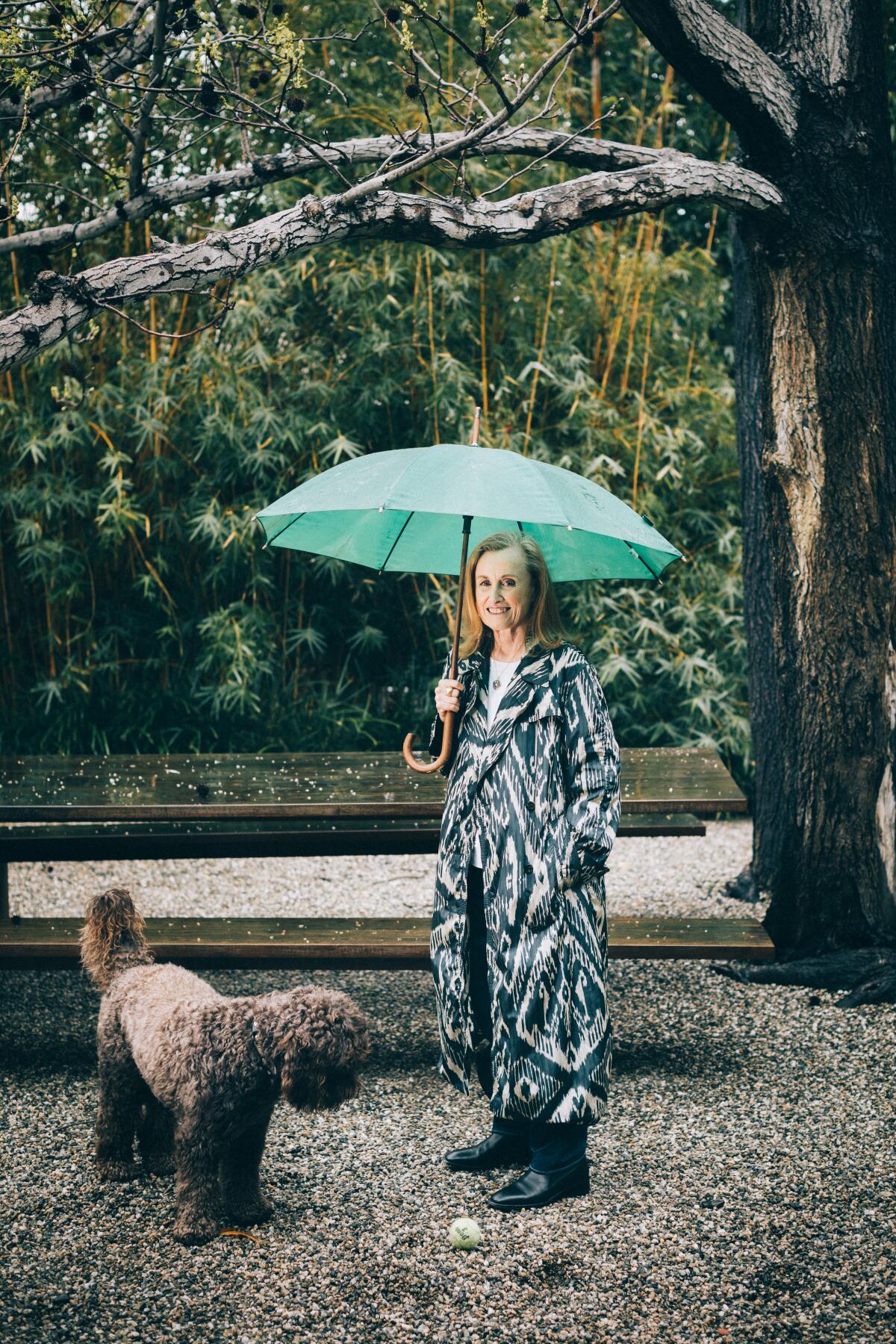Sign up for our Book Club newsletter
Get the latest news, events and more from the Los Angeles Times Book Club, and help us get L.A. reading and talking.
You may occasionally receive promotional content from the Los Angeles Times.

On the Shelf
Commitment
By Mona Simpson
Knopf, 416 pages, $30
If you buy books linked on our site, The Times may earn a commission from Bookshop.org, whose fees support independent bookstores.
When I contact Mona Simpson about setting up an interview timed to the publication of her new novel, “Commitment,” she replies in what can only be described as an extraordinary way.
She suggests we meet in Glendale, not far from where I live and very far from her Westside home.
Simpson, whose 1986 debut novel, “Anywhere but Here,” launched both a notable career and a refreshingly clear-eyed way of writing about life in Los Angeles, also had a faculty meeting on the day in question at UCLA, where she has taught creative writing for almost 25 yeas.
But she has a favorite restaurant in Glendale, Zhengyalov Hatz, which she assumes I will know. I do not. So when I arrive, Simpson explains: Zhengyalov Hatz serves only one thing.
The eponymous dish consists of Armenian flatbread wrapped around a bright green filling made up of 15 types of minced herbs and greens. It is fresh and delicious in a surprisingly complicated way, with the light tang of sorrel and the earthiness of beetroot leaves crunching alongside many other flavors against the soft, yeasty-sweet bread.
“I love it so much,” Simpson says. “Only one thing and it’s always delicious.”
Celebrated for her novels, occasionally vilified for a persona she can’t control, the author of “Death in Her Hands” is our prophet of loneliness.
The original restaurant, in the Armenian capital of Yerevan, was established by Vresh Osipian to preserve a specialty of his native Artsakh, located on the Armenia-Azerbaijan border.
So it makes perfect sense that Simpson would love Zhengyalov Hatz. She too has built a career making one thing that feels like home, rooted in the past and full of surprising complexities. Something that seems simple enough — the story of a family — but never really is.
Beginning with “Anywhere but Here” (later adapted into a film), Simpson’s seven novels explore the complications of childhood, parenthood and personhood, tracing the flow and impact of our closest and most perilous relationships with the fervor of a cartographer chronicling tributaries of the Nile and the delicacy of a surgeon attempting to locate and repair an aneurysm.

The difference between happy and unhappy notwithstanding, every family history is an epic tale, but Simpson’s has more than a few notable features. She was born in Wisconsin to parents who divorced when she was very young. Her father returned to his native Syria and her mother, who struggled with mental health issues, remarried, divorced again and eventually moved with her daughter to Los Angeles. Simpson later learned that her parents had had a child before they were married and given him up for adoption; she was in her mid-20s when she first met her brother, Apple founder Steve Jobs.
Simpson went to UC Berkeley and worked for a time as a freelance journalist before getting an MFA in creative writing from Columbia and working at the Paris Review. She published “Anywhere but Here” in 1986 to enormous success and later followed her lawyer-turned-TV-writer husband back to Los Angeles; they had two children and later divorced.
It can be reductive to link an artist’s life too closely to her work, but in every Simpson novel there is an element of personal experience: the emotionally/mentally challenged mother of her debut; the absent Middle Eastern father in its sequel, “The Lost Father”; the tech billionaire of “A Regular Guy”; the artist struggling with motherhood and a largely absent TV-writer spouse in “My Hollywood.” The same is true of her latest.
From her wildly successful podcast, Zibby Owens has built a media empire, complete with her own publishing company and, starting Feb. 18, a Santa Monica bookstore.
The novel follows the lives of Walter, Lina and Donnie Aziz just before — and then for years after — their mother, Diane, commits herself to a mental hospital.
Walter, who has just entered college at Berkeley, is haunted by economic worries and guilt — “after his mom went into the hospital, he never again felt he should be where he was.” Lina, who, like a young Simpson, works in an ice cream parlor, dreams of going to Barnard and becoming an artist but worries about Donnie, who is still a child. “So here we go,” Lina thinks when she learns her mother has been hospitalized. “The long terror had finally begun. They had to hold on. Eventually it would be over.”
Their father, known as “the Afghan,” is not available emotionally or financially, but one of Diane’s fellow nurses, Julie, steps in as an unofficial but increasingly pivotal aunt.
The book’s title refers to many things — Diane’s decision to be hospitalized, her children’s struggles to find their own identities while remaining a family and Simpson’s relationship to narrative.
Their lives, like the lives of all Simpson’s characters, are described in vivid detail — studying for biochem finals and dressing for interviews and dates are given as much weight as scrambling to pay bills and monitoring their mother’s progress. This is life’s mishmash of greens and herbs: bitter, tangy and sweet all at once.
A caring ice cream shop manager and co-workers’ poignant stories made a lasting impression on Mona Simpson long before she became a writer.
For Simpson, “Commitment” is an exploration of what life might have been like if her mother had gotten the treatment she needed. “I grew up with a single mom who had issues,” she says. “No diagnoses but delusions. I wanted to see if there could have been a better way for her. My life would have been worse, but maybe it would have been better for her.”
As someone who grew up “in the age of institutions,” Simpson says, she was interested in exploring institutionalized care — what it was like then and what it’s like now. “It started so idealistically, state-sponsored care, and then people just began dumping their old relatives there.”

In the course of the story, Diane receives various levels of care, but none of it could be characterized as abusive, which was important to Simpson. “I came of age with ‘One Flew Over the Cuckoo’s Nest,’” she says, “and of course there were abuses, but many people received very good care at these places, people who now have no place to go. Our society isn’t equipped to deal with people who can’t care for themselves.”
But “Commitment” is not so much Diane’s story as it is her children’s, following a family that has become untethered. Each child narrates his or her own experience of a life dominated by an absent mother.
Simpson’s strength as a writer has always been in capturing life as it is actually lived; no matter how extreme the situation, her characters inhabit a reality of recognizable details that coalesce into a story, rather than a story into which details have been added.
Novelist Cathleen Schine explains why ‘Künstlers in Paradise’ focuses on those who’ve found refuge in L.A. — first from the Nazis and then from Covid.
It’s slow work, she says — “Commitment” took about six years to write, including much that didn’t make the final edit. “I have a lot of ideas, but not all of those ideas have a door,” she says. “You have to find the door.”
“I think what I aspire to (and haven’t yet achieved),” she adds via email, “is to show people living their lives, deeply influenced by forces of history, though they don’t always understand that.”
I ask Simpson if she has ever considered working in another genre — science fiction or fantasy, say — and am surprised when she responds that she’s never “been interested in complete world-building.” As if world-building isn’t exactly what she does.
“I do like ghost stories,” she adds, “but only if it works both ways. If it could be supernatural but also psychological. Like ‘Turn of the Screw.’”

There are indeed ghosts in Simpson’s stories, often in the form of missing or troubled parents, just as there are in Simpson’s life. Her mother is gone, as is the father who reentered her life when she was an adult. Gone too is Jobs; the two became very close, and after his death in 2010, Simpson’s extraordinary eulogy for him circulated widely and was published in the New York Times.
But the woman herself is anything but haunted. She makes short, delighted work of her zhengyalov hatz while encouraging me to get a few to-go. The interview is challenging because Simpson is very easy to talk to; the conversation has a way of sliding sideways, off the topic and into compared notes about young adult children (she has two), the challenges of living in New York as a young journalist and, yes, her life as a cartoon character.
I thought the purse my husband gave me was lovely but too small. Then I saw that was the point: With my kids grown, it’s time to let the big mom-bag go.
In the early ’90s, her now-ex-husband, Richard Appel, left New York — and his job as a city prosecutor — to join the writers’ room of “The Simpsons.” Homer’s mother, Mona, was named for her. “He had gotten a 10-week contract, then another, and suddenly our preschool is asking for a big donation,” she says. “I asked them why on earth they thought we could afford that and they said, ‘Oh, didn’t you invent ‘The Simpsons’?”
Appel did get a staff position on the show, and Simpson joined him in L.A., embracing the city where she had lived as a teenager. “L.A. is the great American city,” she says. “As a reader I can’t believe how stereotypes about L.A. still appear in fiction and nonfiction.”
Including and especially the notion that every novelist secretly wants to work in film and television.
“Never,” she says, laughing. “I’ve seen that world close up. My son writes for TV — he just sold his first pilot — and it has changed. When I was coming up, no one would have suggested that a novelist write for TV. But it’s very collaborative, and I’m not used to that.
“I like being a novelist,” she adds. “I wish I could do it a bit faster, but it is the thing I do.”
Simpson will discuss her work at the Hammer Museum on Thursday, April 27 at 7:30 p.m.
Sign up for our Book Club newsletter
Get the latest news, events and more from the Los Angeles Times Book Club, and help us get L.A. reading and talking.
You may occasionally receive promotional content from the Los Angeles Times.